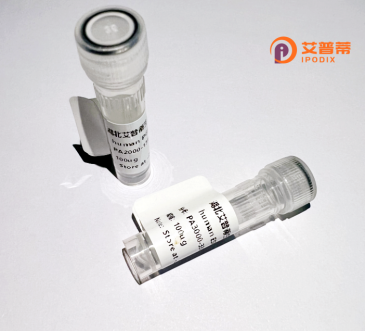
| 纯度 | >90%SDS-PAGE. |
| 种属 | Human |
| 靶点 | ARMC9 |
| Uniprot No | Q7Z3E5 |
| 内毒素 | < 0.01EU/μg |
| 表达宿主 | E.coli |
| 表达区间 | 1-665aa |
| 氨基酸序列 | MGDILAHESELLGLVKEYLDFAEFEDTLKTFSKECKIKGKPLCKTVGGSFRDSKSLTIQKDLVAAFDNGDQKVFFDLWEEHISSSIRDGDSFAQKLEFYLHIHFAIYLLKYSVGRPDKEELDEKISYFKTYLETKGAALSQTTEFLPFYALPFVPNPMVHPSFKELFQDSWTPELKLKLEKFLALISKASNTPKLLTIYKENGQSNKEILQQLHQQLVEAERRSVTYLKRYNKIQADYHNLIGVTAELVDSLEATVSGKMITPEYLQSVCVRLFSNQMRQSLAHSVDFTRPGTASTMLRASLAPVKLKDVPLLPSLDYEKLKKDLILGSDRLKAFLLQALRWRLTTSHPGEQRETVLQAYISNDLLDCYSHNQRSVLQLLHSTSDVVRQYMARLINAFASLAEGRLYLAQNTKVLQMLEGRLKEEDKDIITRENVLGALQKFSLRRPLQTAMIQDGLIFWLVDVLKDPDCLSDYTLEYSVALLMNLCLRSTGKNMCAKVAGLVLKVLSDLLGHENHEIQPYVNGALYSILSVPSIREEARAMGMEDILRCFIKEGNAEMIRQIEFIIKQLNSEELPDGVLESDDDEDEDDEEDHDIMEADLDKDELIQPQLGELSGEKLLTTEYLGIMTNTGKTRRKGLANVQWSGDEPLQRPVTPGGHRNGYPV |
| 分子量 | 99.55 kDa |
| 蛋白标签 | GST-tag at N-terminal |
| 缓冲液 | 冻干粉 |
| 稳定性 & 储存条件 | Lyophilized protein should be stored at ≤ -20°C, stable for one year after receipt. Reconstituted protein solution can be stored at 2-8°C for 2-7 days. Aliquots of reconstituted samples are stable at ≤ -20°C for 3 months. |
| 复溶 | Always centrifuge tubes before opening.Do not mix by vortex or pipetting. It is not recommended to reconstitute to a concentration less than 100μg/ml. Dissolve the lyophilized protein in distilled water. Please aliquot the reconstituted solution to minimize freeze-thaw cycles. |
以下是关于重组人含LisH结构域的蛋白(ARMC9)的3篇代表性文献,按研究内容与时间整理:
---
1. **文献名称**:ARMC9 Mutations Cause Joubert Syndrome by Disrupting Ciliogenesis
**作者**:Van De Weghe, J.C., et al.
**摘要**:研究发现ARMC9基因突变通过破坏纤毛形成导致Joubert综合征。ARMC9通过与CEP104相互作用参与纤毛轴丝组装,其缺失会导致纤毛结构异常及神经发育缺陷。
2. **文献名称**:ARMC9 regulates the assembly of the IPMN compartment and ciliogenesis
**作者**:Bader, J.R., et al.
**摘要**:揭示了ARMC9在初级纤毛形成中的关键作用,其缺失导致纤毛缩短和Wnt/β-catenin信号通路失调,进一步证明其通过与CEP128等蛋白互作调控纤毛膜延伸。
3. **文献名称**:Mutations in ARMC9. a minor component of the basal body transition zone, cause Joubert syndrome
**作者**:Stephenson, K.A., et al.
**摘要**:通过外显子测序在Joubert综合征患者中鉴定出ARMC9突变,证明该蛋白在纤毛过渡带的功能障碍是疾病发生的主要机制。
---
以上文献聚焦于ARMC9在纤毛发生、信号传导及疾病关联中的核心作用,研究内容涵盖分子机制到临床表型。如需获取全文,可通过PubMed或期刊官网查询具体标题及作者。
ARMC9 (Armadillo Repeat-Containing Protein 9) is a conserved eukaryotic protein characterized by an N-terminal LisH (Lissencephaly type-1-like homology) domain and multiple armadillo (ARM) repeats. The LisH domain is implicated in dimerization and protein-protein interactions, while ARM repeats typically mediate molecular recognition and scaffolding. ARMC9 is predominantly localized to the cytoplasm and basal bodies of cilia, with emerging roles in ciliogenesis and Wnt signaling regulation.
Studies link ARMC9 to ciliopathies, particularly Joubert syndrome, a neurodevelopmental disorder marked by cerebellar malformations and retinal dystrophy. Mutations in ARMC9 disrupt ciliary structure and function, impairing signaling pathways critical for embryonic development. Functional studies in zebrafish and mouse models demonstrate that ARMC9 loss leads to ciliary defects, neurological abnormalities, and developmental delays. Interactome analyses suggest its interaction with ciliary transport proteins (e.g., TTBK2) and components of the Wnt/β-catenin pathway, though precise mechanisms remain under investigation.
Despite progress, ARMC9's molecular functions are not fully elucidated. Recent proteomic studies (2023) highlight its potential involvement in microtubule dynamics and cell cycle regulation. Its conservation across species underscores fundamental biological significance. ARMC9 is now a candidate biomarker and therapeutic target for ciliopathies, though further research is needed to unravel its regulatory networks and pathophysiological contributions.
×